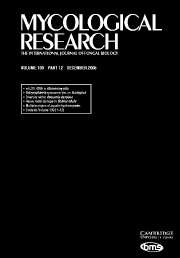Crossref Citations
This article has been cited by the following publications. This list is generated based on data provided by
Crossref.
Ypsilos, Ioannis K.
and
Magan, Naresh
2005.
Characterisation of optimum cultural environmental conditions for the production of high numbers ofMetarhizium anisopliaeblastospores with enhanced ecological fitness.
Biocontrol Science and Technology,
Vol. 15,
Issue. 7,
p.
683.
Khachatourians, George G.
and
Qazi, Sohail S.
2008.
Human and Animal Relationships.
p.
33.
Mokiou, Stella
and
Magan, Naresh
2008.
Physiological manipulation and formulation of the biocontrol yeastPichia anomalafor control ofPenicillium verrucosumand ochratoxin A contamination of moist grain.
Biocontrol Science and Technology,
Vol. 18,
Issue. 10,
p.
1063.
Texier, Sabrina
Davy, Maxime
and
Cliquet, Sophie
2009.
Culture age impactsPlectosporium alismatispropagule yields and subsequent desiccation and UV-radiation tolerance.
Biocontrol Science and Technology,
Vol. 19,
Issue. 3,
p.
277.
Ravensberg, Willem J.
2011.
A Roadmap to the Successful Development and Commercialization of Microbial Pest Control Products for Control of Arthropods.
p.
59.
Dunlap, Christopher A.
Jackson, Mark A.
and
Saha, Badal C.
2011.
Compatible solutes of sclerotia ofMycoleptodiscus terrestrisunder different culture and drying conditions.
Biocontrol Science and Technology,
Vol. 21,
Issue. 1,
p.
113.
Sevim, Ali
Donzelli, Bruno G. G.
Wu, Dongliang
Demirbag, Zihni
Gibson, Donna M.
and
Turgeon, B. Gillian
2012.
Hydrophobin genes of the entomopathogenic fungus, Metarhizium brunneum, are differentially expressed and corresponding mutants are decreased in virulence.
Current Genetics,
Vol. 58,
Issue. 2,
p.
79.
Taylor, B.
Edgington, S.
Luke, B.
and
Moore, D.
2013.
Yield and germination of the entomopathogenic fungus Beauveria bassiana when grown on different rice preparations.
Journal of Stored Products Research,
Vol. 53,
Issue. ,
p.
23.
Le Grand, Mélanie
and
Cliquet, Sophie
2013.
Impact of culture age on conidial germination, desiccation and UV tolerance of entomopathogenic fungi.
Biocontrol Science and Technology,
Vol. 23,
Issue. 7,
p.
847.
Mascarin, Gabriel Moura
Jackson, Mark A.
Kobori, Nilce Naomi
Behle, Robert W.
Dunlap, Christopher A.
and
Delalibera Júnior, Ítalo
2015.
Glucose concentration alters dissolved oxygen levels in liquid cultures of Beauveria bassiana and affects formation and bioefficacy of blastospores.
Applied Microbiology and Biotechnology,
Vol. 99,
Issue. 16,
p.
6653.
Goble, Tarryn A.
Gardescu, Sana
Jackson, Mark A.
and
Hajek, Ann E.
2016.
Evaluating different carriers of Metarhizium brunneum F52 microsclerotia for control of adult Asian longhorned beetles (Coleoptera: Cerambycidae).
Biocontrol Science and Technology,
Vol. 26,
Issue. 9,
p.
1212.
Mascarin, Gabriel Moura
Jackson, Mark A.
Behle, Robert W.
Kobori, Nilce N.
and
Júnior, Ítalo Delalibera
2016.
Improved shelf life of dried Beauveria bassiana blastospores using convective drying and active packaging processes.
Applied Microbiology and Biotechnology,
Vol. 100,
Issue. 19,
p.
8359.
Fisher, Joanna J.
Castrillo, Louela A.
Donzelli, Bruno G. G.
and
Hajek, Ann E.
2017.
Starvation and Imidacloprid Exposure Influence Immune Response by Anoplophora glabripennis (Coleoptera: Cerambycidae) to a Fungal Pathogen.
Journal of Economic Entomology,
Vol. 110,
Issue. 4,
p.
1451.
Jaronski, S.T.
and
Mascarin, G.M.
2017.
Microbial Control of Insect and Mite Pests.
p.
141.
van Laarhoven, Karel A.
Peeters, Loes H. M.
Bekker, Mirjam
Huinink, Hendrik P.
and
Adan, Olaf C. G.
2017.
Conidia of Penicillium rubens formed at low water activities can attract more water.
MicrobiologyOpen,
Vol. 6,
Issue. 6,
Mascarin, G.M.
Kobori, N.N.
Jackson, M.A.
Dunlap, C.A.
and
Delalibera, Í.
2018.
Nitrogen sources affect productivity, desiccation tolerance and storage stability ofBeauveria bassianablastospores.
Journal of Applied Microbiology,
Vol. 124,
Issue. 3,
p.
810.
Krell, Vivien
Jakobs-Schoenwandt, Desirée
Persicke, Marcus
and
Patel, Anant V.
2018.
Endogenous arabitol and mannitol improve shelf life of encapsulated Metarhizium brunneum.
World Journal of Microbiology and Biotechnology,
Vol. 34,
Issue. 8,
Zhou, Yanni
Cui, Xiaoyue
Hu, Anni
Miao, Yahui
and
Zhang, Lingyun
2020.
Characterization and functional analysis of pollen-specific PwSWEET1 in Picea wilsonii.
Journal of Forestry Research,
Vol. 31,
Issue. 5,
p.
1913.
Dietsch, Robin
Jakobs-Schönwandt, Desiree
Grünberger, Alexander
and
Patel, Anant
2021.
Desiccation-tolerant fungal blastospores: From production to application.
Current Research in Biotechnology,
Vol. 3,
Issue. ,
p.
323.
Mascarin, Gabriel Moura
Kobori, Nilce Naomi
Coleman, Jeffrey J.
and
Jackson, Mark Alan
2023.
Impact of osmotic stress on production, morphology, and fitness of Beauveria bassiana blastospores.
Applied Microbiology and Biotechnology,
Vol. 107,
Issue. 15,
p.
4815.




